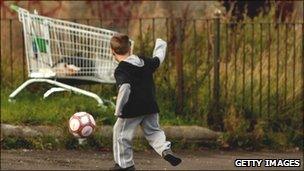Child poverty figures fell in UK during 2009/2010
- Published

Barnardo's warned the figures were a "temporary reprieve in the battle against child poverty"
The number of children living in poverty in the UK fell during the last year of the Labour government, official figures have revealed.
In 2009-10, 20% of children (2.6m) lived in households classed as below the poverty line, a two per cent decrease on the previous year.
Children's charities offered a cautious welcome to the statistics but warned the future looked bleaker.
Ministers say the figures signal a poor return on Labour's huge investment.
Work and Pensions Secretary Iain Duncan Smith said: "These figures lay bare the growth of income inequality in the UK which is now the highest it has ever been.
"This gap between the poorest and richest in our society has accelerated over the last five years despite an astonishing £150bn injected into tax credits alone."
The only way to achieve a sustainable drop in poverty was through work, he added.
The government says its radical overhaul of the benefits system, with the introduction of "universal credit", will help almost a million people, including 350,000 children, out of poverty.
'Beggars belief'
The Households Below Average Income statistics, external, which also cover working-age adults and pensioners, define poverty as children living in homes with 60% less than the median UK income before housing costs. The median is the middle figure in a set of numbers.
After housing costs were taken into consideration, the number of children living in relative poverty increased to 3.8m (29%). This represents a more modest fall of one per cent compared to the previous year.
The figures for adults in poverty remained fairly static, with 16% of the working age population (5.7m) living in relative poverty before housing costs are accounted for. This represented a slight fall of 100,000.
Some 18% of pensioners (2.1m) were living in relative poverty before housing costs, representing a two per cent fall on the previous year but no change after housing costs were paid.
Barnardo's said it feared the "good news" was only a "temporary reprieve in the battle against child poverty".
Chief executive Anne Marie Carrie said: "We remain concerned that numbers may well rise again due to cuts and the economic downturn."
The Child Poverty Action Group and the Joseph Rowntree Foundation echoed concerns that spending cuts could prompt a reverse in the fall in child poverty.
Unicef and Save the Children pointed out that millions of children were still struggling.
Labour said the figures proved the party's good record on lifting children out of poverty.
Margaret Curran, shadow work and pensions minister, said: "If the Tories are claiming that work is the best route out of poverty it beggars belief that they are hitting families with a squeeze on childcare costs.
"They should be making it easier for parents to work and pay tax so that we can get the deficit down."
- Published28 April 2011
- Published5 April 2011
- Published5 April 2011